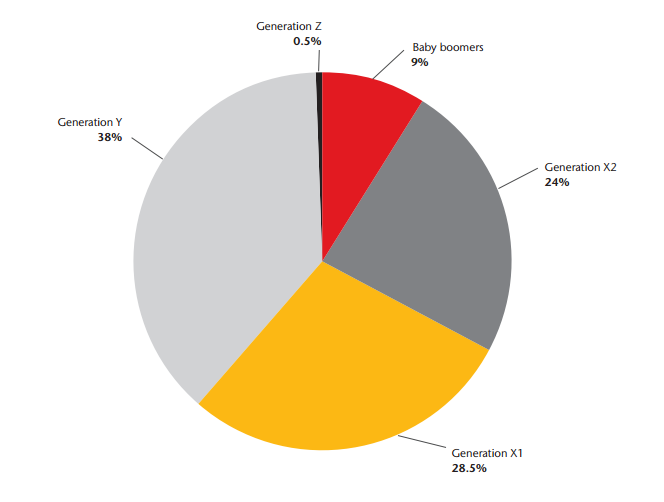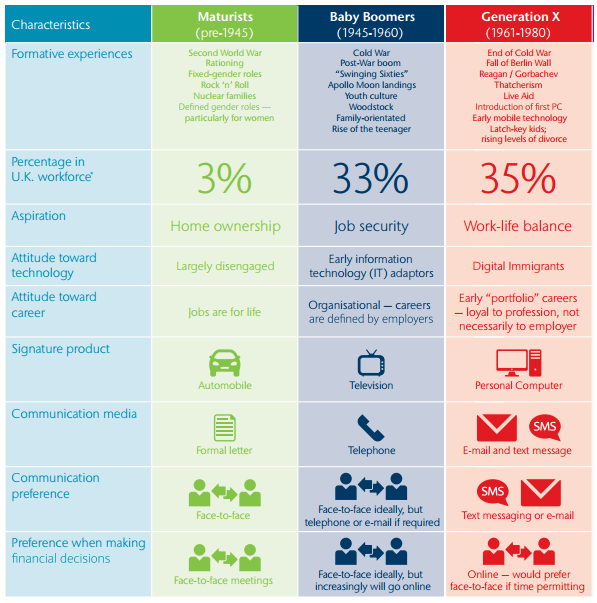September 24, 2015
Unhelpful generalisations about generations based on hype, claims report 0
 For the first time, the age span of people in any workplace is now routinely between 16 and 75, as more people work past 60 than ever before. This means the UK is experiencing the widest working demographic in living memory. Yet generalisations about generations may simply be unhelpful, a new study into employee benefits has concluded. The report by Martha How, reward partner at Aon suggests a trend towards generational segmentation is much too simplistic and not necessarily supportive of employees or employer’s needs. She argues that the common view that we now have five generations in the workforce, each with differing needs and preferences are being overplayed. In fact, there is often too much of a tendency drift into caricature – for example, that twenty-somethings aren’t interested in pensions, while fifty-somethings worry mainly about pension and health.
For the first time, the age span of people in any workplace is now routinely between 16 and 75, as more people work past 60 than ever before. This means the UK is experiencing the widest working demographic in living memory. Yet generalisations about generations may simply be unhelpful, a new study into employee benefits has concluded. The report by Martha How, reward partner at Aon suggests a trend towards generational segmentation is much too simplistic and not necessarily supportive of employees or employer’s needs. She argues that the common view that we now have five generations in the workforce, each with differing needs and preferences are being overplayed. In fact, there is often too much of a tendency drift into caricature – for example, that twenty-somethings aren’t interested in pensions, while fifty-somethings worry mainly about pension and health.
 According to the report, the evidence suggests that this thinking is too simplistic, and although influences can be mapped to some extent against generational differences, not all workers and workforces display the same characteristics.
According to the report, the evidence suggests that this thinking is too simplistic, and although influences can be mapped to some extent against generational differences, not all workers and workforces display the same characteristics.
The analysis of seven areas of research based on a dataset of over 130,000 employees found that many of the psychological forces that people face when making pay and benefits choices influence attitude regardless of age.
 The conclusion is that generations in the workplace are more similar than we think. “All employees at a fundamental level want the same core things from employers. Indeed, generalisations about generations may simply be unhelpful,” said How.
The conclusion is that generations in the workplace are more similar than we think. “All employees at a fundamental level want the same core things from employers. Indeed, generalisations about generations may simply be unhelpful,” said How.
“Employers need to apply segmentation intelligently – by age may be appropriate if it’s done carefully and is based on data specific to the organisation. Making sweeping assumptions is dangerous.However our research shows that there do appear to be distinct differences in communication preferences across the generations. For employee demographics with wide age ranges, it is essential for employers to use multi-media communication strategies and consider carefully, and potentially even vary, content that truly gets the message across to the whole employment base.”
The report concludes that regardless of age, when asked about reward attitudes most employees are concerned about:
- Cash sufficient to meet living costs, security for self and family
- Cash for “above living costs
- Recognition and career advancement as it serves 1 and 2
- Pension sufficient to fund retirement
- Health care (for themselves and their families) especially in the UK given the pressures on the NHS and increasing longevity
- Recognition for achievement divorced from financial gain
- Good value benefits from their employer
The author concludes: “This list (and the order it is set out) to some extent echo’s Maslow’s thinking that says in very broad terms… basic human needs should be satisfied first before the “bells and whistles” can be addressed. If this is, in the most part, true does this dismiss generational segmentation as foolish? Is it just hype which the HR community has taken from the world of consumer product marketing and applied “blind” of employment reality? No… the HR community has been grappling with this issue for some time and “blind” is wholly inappropriate here! A number of matters do vary significantly by generation and a number of matters impact us all and we urge employers to apply generational thinking with care to support a “smart reward” strategy which addresses certain core issues.”















